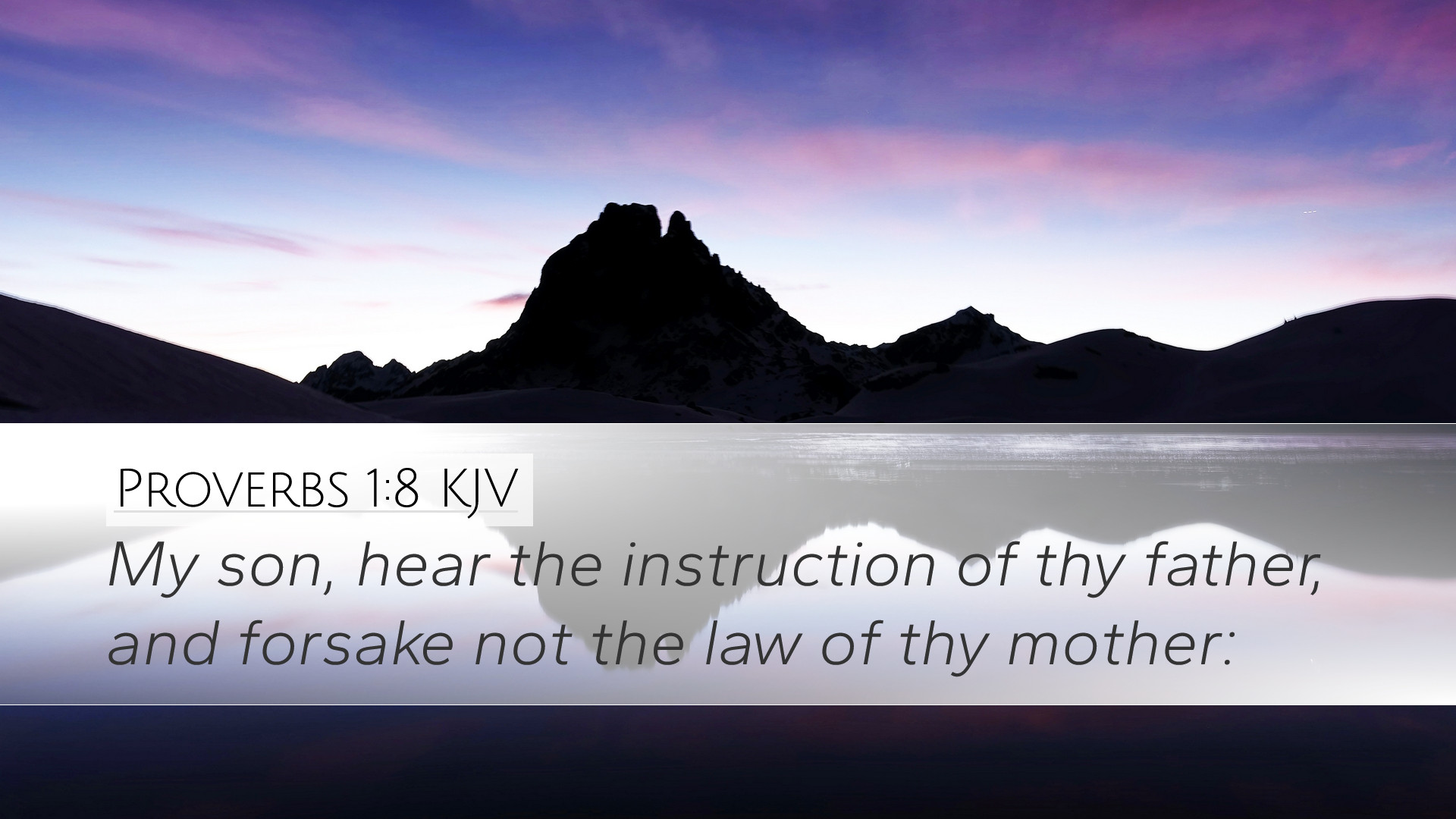Commentary on Proverbs 1:8
Proverbs 1:8 states: "My son, hear the instruction of thy father, and forsake not the law of thy mother."
Introduction
The opening chapters of Proverbs set the stage for the pursuit of wisdom. In this particular verse, we see a parental call to heed instruction, emphasizing the importance of familial guidance in the quest for knowledge and understanding.
Parental Authority
Insight from Matthew Henry: In his commentary, Henry notes the significance of parental authority in this verse. The repetition of "father" and "mother" stresses the importance of both parents as teachers, suggesting that their combined wisdom is essential for a well-rounded understanding of life. Henry emphasizes that children should regard the instructions of their parents with reverence, as they are divinely appointed to nurture and guide them.
Insight from Albert Barnes: Barnes complements Henry's view by expounding on the cultural and spiritual imperatives of listening to parental advice. He indicates that this instruction is not merely optional; rather, it carries an expectation of obedience that arises from the rightful position of parents as guides and protectors. The implication is clear: disregarding this counsel could lead to folly.
Insight from Adam Clarke: Clarke enhances this understanding by contextualizing the Hebrew terms used in this verse. He points out that the term "hear" suggests an active engagement with the teaching, implying that listening must lead to action. Clarke further notes that the "law of thy mother" may refer to both the ethical teachings passed down through societal norms and the nurturing values that mothers typically embody.
The Importance of Instruction
Role of Wisdom and Knowledge: All three commentators agree on the overarching theme of seeking wisdom. They collectively underscore that true wisdom begins with recognizing and valuing instruction, particularly the wisdom imparted by parents. Henry implies that the foundational values instilled by parents serve as a springboard into broader societal wisdom.
- Building Character: These instructions contribute to the moral and spiritual foundation of the child, shaping their character and guiding their decisions throughout life.
- Modern Applications: The insights from this verse appeal to contemporary discussions on parenting, reinforcing the need for active communication and mentorship within families.
- Iterative Learning: Proverbs invites an ongoing dialogue between generations, where wisdom is shared and built upon, leading to a deeper understanding of divine principles.
The Dual Aspects of Parental Instruction
Complementary Roles of Parents: The verse illustrates how the father’s and mother’s teachings are distinct yet complementary. Henry elaborates that while fathers often focus on instilling discipline and authority, mothers usually emphasize compassion and nurturing. This dual aspect helps form a balanced approach to wisdom.
Holistic Development: Barnes adds that the dual instruction from both parents cultivates a richer understanding of life's complexities. He highlights that children benefit from diverse perspectives, which equip them to navigate challenges effectively.
Significance of Adherence: Clarke points out that ignoring the law of the mother could lead children away from paths of righteousness. The implication here is profound: the teachings of both parents are integral to moral discipline, guiding children towards a life characterized by integrity and sound judgment.
Spiritual Implications
Call to Action: In Proverbs, the call to heed parental instruction transcends mere obedience; it invites children to embrace a lifelong pursuit of wisdom—the ultimate goal being alignment with God’s will. Henry remarks that our earthly relationships mirror our relationship with God, emphasizing that listening to parents is akin to listening to God.
The Role of Scripture: All three commentators point out the significance of grounding one's life in biblical truths. The advice in Proverbs is not confined to family dynamics but extends to a broader invitation to engage with Scripture as the ultimate source of wisdom and guidance.
- Fostering a Relationship with God: Understanding the instructions from parents as reflective of divine guidance enhances children’s relationship with God, fostering a sense of accountability and moral responsibility.
- Equipping for Life’s Trials: These teachings aim to equip children not only for immediate challenges but also for life’s broader trials, establishing a framework for decision-making that honors both God and family.
Conclusion
Proverbs 1:8 serves as a profound reminder of the vital role parental instruction plays in the spiritual and moral development of children. Matthew Henry, Albert Barnes, and Adam Clarke collectively urge us to see this verse not just as a call for obedience, but as an invitation to cultivate wisdom through the valuing of familial lessons. Embracing such teachings lays a foundation for a life oriented towards understanding and following God's will, thereby enriching one’s spiritual journey and character development.


